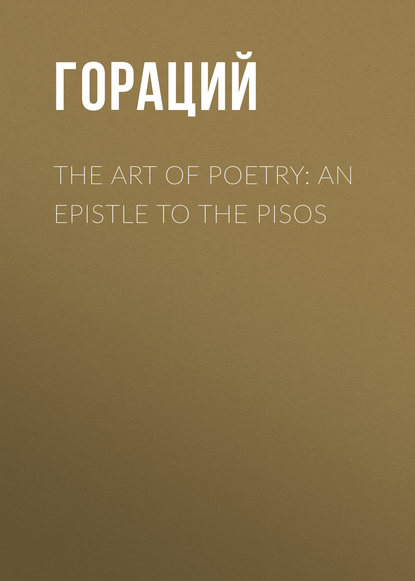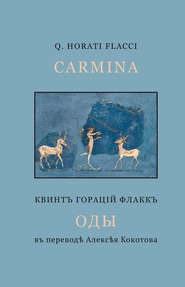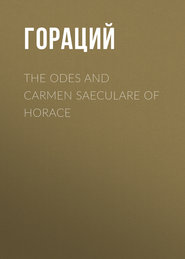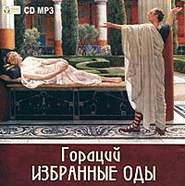По всем вопросам обращайтесь на: info@litportal.ru
(©) 2003-2024.
✖
The Art of Poetry: an Epistle to the Pisos
Настройки чтения
Размер шрифта
Высота строк
Поля
Know you the old Sicilian Poet's end?
Deus immortalis haberi.
Dum cupit Empedocles, ardeatem frigidus aetnam
Infiluit. sit fas, liceatque perire poetis.
Invitum qui fervat, idem facit occidenti.
Nec semel hoc fecit; nec si retractus erit jam,
Fiet homo, et ponet famosae mortis amorem.
Nec fatis apparet, cur versus factitet; utrum
Minxerit in patrios cineres, an triste bidental
Moverit incestus: certe furit, ac velut ursus
Objectos caveae valuit è srangere clathros,
* * * * *
Empedocles, ambitious to be thought
A God, his name with Godlike honours fought,
Holding a worldly life of no account,
Lead'p coldly into aetna's burning mount.–
Let Poets then with leave resign their breath,
Licens'd and priveleg'd to rush on death!
Who gives a man his life against his will,
Murders the man, as much as those who kill.
'Tis not once only he hath done this deed;
Nay, drag him forth! your kindness wo'n't succeed:
Nor will he take again a mortal's shame,
And lose the glory of a death of fame.
Nor is't apparent, why with verse he's wild:
Whether his father's ashes he defil'd;
Whether, the victim of incestuous love,
The Blasted Monument he striv'd to move:
Whate'er the cause, he raves; and like a Bear,
Burst from his cage, and loose in open air,
Indoctum doctumque fugat recitator acerbus.
Quem vero arripuit, tenet, occiditque legendo,
Non miffura cutem, nisi plena cruroris, hirudo.
* * * * *
Learn'd and unlearn'd the Madman puts to flight,
They quick to fly, he bitter to recite!
What hapless soul he seizes, he holds fast;
Rants, and repeats, and reads him dead at last:
Hangs on him, ne'er to quit, with ceaseless speech.
Till gorg'd and full of blood, a very Leech!
Notes on the EPISTLE to the PISOS
Notes
I have referred the Notes to this place, that the reader might be left to his genuine feelings, and the natural impression on reading the Epistle, whether adverse or favourable to the idea I ventured to premise, concerning its Subject and Design. In the address to my learned and worthy friends I said little more than was necessary so open my plan, and to offer an excuse for my undertaking. The Notes descend to particulars, tending to illustrate and confirm my hypothesis; and adding occasional explanations of the original, chiefly intended for the use of the English Reader. I have endeavoured, according to the best of my ability, to follow the advice of Roscommon in the lines, which I have ventured to prefix to these Notes. How far I may be entitled to the poetical blessing promised by the Poet, the Publick must determine: but were I, avoiding arrogance, to renounce all claim to it, such an appearance of Modesty would includes charge of Impertinence for having hazarded this publication. Take pains the genuine meaning to explore!
There sweat, there strain, tug the laborious oar:
Search ev'ry comment, that your care can find;
Some here, some there, may hit the Poet's mind:
Yet be not blindly guided by the Throng;
The Multitude is always in the Wrong.
When things appear unnatural or hard,
Consult your author, with himself compar'd!
Who knows what Blessing Phoebus may bestow,
And future Ages to your labour owe?
Such Secrets are not easily found out,
But once discoverd, leave no room for doubt.
truth stamps conviction in your ravish'd breast,
And Peace and Joy attend the glorious guest.
Essay on Translated Verse ART of POETRY, an EPISTLE, &c.
Q. HORATII FLACCI EPISTOLA AD PISONES.
The work of Horace, now under consideration, has been so long known, and so generally received, by the name of The Art of Poetry, that I have, on account of that notoriety, submitted this translation to the Publick, under that title, rather than what I hold to be the true one, viz. Horace's Epistle to The Pisos. The Author of the English Commentary has adopted the same title, though directly repugnant to his own system; and, I suppose, for the very same reason.
The title, in general a matter of indifference, is, in the present instance, of much consequence. On the title Julius Scaliger founded his invidious, and injudicious, attack. De arte quares quid sentiam. Quid? eqvidem quod de arte, sine arte traditâ. To the Title all the editors, and commentators, have particularly adverted; commonly preferring the Epistolary Denomination, but, in contradiction to that preference, almost universally inscribing the Epistle, the Art of Poetry. The conduct, however, of Jason De Nores, a native of Cyprus, a learned and ingenious writer of the 16th century, is very remarkable. In the year 1553 he published at Venice this work of Horace, accompanied with a commentary and notes, written in elegant Latin, inscribing it, after Quintilian, Q. Horatii Flacci Liber De Arte Poetica. [Foot note: I think it right to mention that I have never seen the 1st edition, published at Venice. With a copy of the second edition, printed in Paris, I was favoured by Dr. Warton of Winchester.] The very-next year, however, he printed at Paris a second edition, enriching his notes with many observations on Dante and Petrarch, and changing the title, after mature consideration, to Q. Horatii Flacii EPISTOLA AD PISONES, de Arte Poeticâ. His motives for this change he assigns in the following terms.
Quare adductum me primum sciant ad inscriptionem operis immutandam non levioribus de causis,& quod formam epistolae, non autem libri, in quo praecepta tradantur, vel ex ipso principio prae se ferat, & quod in vetustis exemplaribus Epistolarum libros subsequatur, & quad etiam summi et praestantissimi homines ita sentiant, & quod minimè nobis obstet Quintiliani testimonium, ut nonnullis videtur. Nam si librum appellat Quintilianus, non est cur non possit inter epistolas enumerari, cum et illae ab Horatio in libros digestae fuerint. Quod vero DE ARTE POETICA idem Quintilianus adjangat, nihil commaveor, cum et in epistolis praecepta de aliquâ re tradi possint, ab eodemque in omnibus penè, et in iis ad Scaevam & Lollium praecipuè jam factum videatur, in quibus breviter eos instituit, qua ratione apud majores facile versarentur.
Desprez, the Dauphin Editor, retains both titles, but says, inclining to the Epistolary, Attamen artem poeticam vix appellem cum Quintiliano et aliis: malim vero epistolam nuncupare cum nonnullis eruditis. Monsieur Dacier inscribes it, properly enough, agreable to the idea of Porphyry, Q. Horatii Flacci DE ARTE POETICA LIBER; feu, EPISTOLA AD PISONES, patrem, et filios._
Julius Scaliger certainly stands convicted of critical malice by his poor cavil at the supposed title; and has betrayed his ignorance of the ease and beauty of Epistolary method, as well as the most gross misapprehension, by his ridiculous analysis of the work, resolving it into thirty-six parts. He seems, however, to have not ill conceived the genius of the poem, in saying that it relished satire. This he has urged in many parts of his Poeticks, particularly in the Dedicatory Epistle to his son, not omitting, however, his constant charge of Art without Art. Horatius artem cum inscripsit, adeo sine ulla docet arte, ut satyrae propius totum opus illud esse videatur. This comes almost home to the opinion of the Author of the elegant commentaries on the two Epistles of Horace to the Pisos and to Augustus, as expressed in the Dedication to the latter: With the recital of that opinion I shall conclude this long note. "The genius of Rome was bold and elevated: but Criticism of any kind, was little cultivated, never professed as an art, by this people. The specimens we have of their ability in this way (of which the most elegant, beyond all dispute, are the two epistles to Augustus and the Pisos) are slight occasional attempts, made in the negligence of common sense, and adapted to the peculiar exigencies of their own taste and learning; and not by any means the regular productions of art, professedly bending itself to this work, and ambitious to give the last finishing to the critical system."
[Translated from Horace.] In that very entertaining and instructive publication, entitled An Essay on the Learning and Genius of Pope, the Critick recommends, as the properest poetical measure to render in English the Satires and Epistles of Horace, that kind of familiar blank verse, used in a version of Terence, attempted some years since by the Author of this translation. I am proud of the compliment; yet I have varied from the mode prescribed: not because Roscommon has already given such a version; or because I think the satyrical hexameters of Horace less familiar than the irregular lambicks of Terence. English Blank Verse, like the lambick of Greece and Rome, is peculiarly adapted to theatrical action and dialogue, as well as to the Epick, and the more elevated Didactick Poetry: but after the models left by Dryden and Pope, and in the face of the living example of Johnson, who shall venture to reject rhime in the province of Satire and Epistle?
9.—TRUST ME, MY PISOS!] Credite Pisones!
Monsieur Dacier, at a very early period, feels the influence of the personal address, that governs this Epistle. Remarking on this passage, he observes that Horace, anxious to inspire _the Pisos _with a just taste, says earnestly _Trust me, my Pisos! Credite Pisones! _an expression that betrays fear and distrust, lest _the young Men _should fall into the dangerous error of bad poets, and injudicious criticks, who not only thought the want of unity of subject a pardonable effect of Genius, but even the mark of a rich and luxuriant imagination. And although this Epistle, continues Monsieur Dacier, is addressed indifferently to Piso the father, and his Sons, as appears by v. 24 of the original, yet it is _to the sons in particular _that these precepts are directed; a consideration which reconciles the difference mentioned by Porphyry. Scribit ad Pisones, viros nobiles disertosque, patrem et filios; vel, ut alii volunt, ad pisones fratres.
Desprez, the Dauphin Editor, observes also, in the same strain, Porro _scribit Horatius ad patrem et ad filios Pisones, _praesertim vero ad hos.
The family of the Pisos, to whom Horace addresses this Epistle, were called Calpurnii, being descended from Calpus, son of Numa Pompilius, whence, he afterwards stiles them of the Pompilian Blood. Pompilius Sanguis!
10.—THE VOLUME SUCH] Librum persimilem. Liber, observes Dacier, is a term applied to all literary productions, of whatever description. This remark is undoubtedly just, confirms the sentiments of Jason de Nores, and takes off the force of all the arguments founded on Quintilian's having stiled his Epistle LIBER de arte poetica.
Vossius, speaking of the censure of Scaliger, "de arte, sine arte," subsoins sed fallitur, cum [Greek: epigraphaen] putat esse ab Horatio; qui inscipserat EPISTOLAM AD PISONES. Argumentum vero, ut in Epistolarum raeteris, ita in bâc etiam, ab aliis postea appositum fuit.
19.–OFT WORKS OF PROMISE LARGE, AND HIGH ATTEMPT.] Incaeptis gra- nibus plerumque, &c. Buckingham's Essay on Poetry, Roscommon's Essay on Translated Verse, as well as the Satires, and Art Poetique of Boileau, and Pope's Essay on Criticism, abound with imitations of Horace. This passage of our Author seems to have given birth to the following lines of Buckingham.
'Tis not a slash of fancy, which sometimes,
Dazzling our minds, sets off the slighted rhimes;
Bright as a blaze, but in a moment done;
True Wit is everlasting, like the Sun;
Deus immortalis haberi.
Dum cupit Empedocles, ardeatem frigidus aetnam
Infiluit. sit fas, liceatque perire poetis.
Invitum qui fervat, idem facit occidenti.
Nec semel hoc fecit; nec si retractus erit jam,
Fiet homo, et ponet famosae mortis amorem.
Nec fatis apparet, cur versus factitet; utrum
Minxerit in patrios cineres, an triste bidental
Moverit incestus: certe furit, ac velut ursus
Objectos caveae valuit è srangere clathros,
* * * * *
Empedocles, ambitious to be thought
A God, his name with Godlike honours fought,
Holding a worldly life of no account,
Lead'p coldly into aetna's burning mount.–
Let Poets then with leave resign their breath,
Licens'd and priveleg'd to rush on death!
Who gives a man his life against his will,
Murders the man, as much as those who kill.
'Tis not once only he hath done this deed;
Nay, drag him forth! your kindness wo'n't succeed:
Nor will he take again a mortal's shame,
And lose the glory of a death of fame.
Nor is't apparent, why with verse he's wild:
Whether his father's ashes he defil'd;
Whether, the victim of incestuous love,
The Blasted Monument he striv'd to move:
Whate'er the cause, he raves; and like a Bear,
Burst from his cage, and loose in open air,
Indoctum doctumque fugat recitator acerbus.
Quem vero arripuit, tenet, occiditque legendo,
Non miffura cutem, nisi plena cruroris, hirudo.
* * * * *
Learn'd and unlearn'd the Madman puts to flight,
They quick to fly, he bitter to recite!
What hapless soul he seizes, he holds fast;
Rants, and repeats, and reads him dead at last:
Hangs on him, ne'er to quit, with ceaseless speech.
Till gorg'd and full of blood, a very Leech!
Notes on the EPISTLE to the PISOS
Notes
I have referred the Notes to this place, that the reader might be left to his genuine feelings, and the natural impression on reading the Epistle, whether adverse or favourable to the idea I ventured to premise, concerning its Subject and Design. In the address to my learned and worthy friends I said little more than was necessary so open my plan, and to offer an excuse for my undertaking. The Notes descend to particulars, tending to illustrate and confirm my hypothesis; and adding occasional explanations of the original, chiefly intended for the use of the English Reader. I have endeavoured, according to the best of my ability, to follow the advice of Roscommon in the lines, which I have ventured to prefix to these Notes. How far I may be entitled to the poetical blessing promised by the Poet, the Publick must determine: but were I, avoiding arrogance, to renounce all claim to it, such an appearance of Modesty would includes charge of Impertinence for having hazarded this publication. Take pains the genuine meaning to explore!
There sweat, there strain, tug the laborious oar:
Search ev'ry comment, that your care can find;
Some here, some there, may hit the Poet's mind:
Yet be not blindly guided by the Throng;
The Multitude is always in the Wrong.
When things appear unnatural or hard,
Consult your author, with himself compar'd!
Who knows what Blessing Phoebus may bestow,
And future Ages to your labour owe?
Such Secrets are not easily found out,
But once discoverd, leave no room for doubt.
truth stamps conviction in your ravish'd breast,
And Peace and Joy attend the glorious guest.
Essay on Translated Verse ART of POETRY, an EPISTLE, &c.
Q. HORATII FLACCI EPISTOLA AD PISONES.
The work of Horace, now under consideration, has been so long known, and so generally received, by the name of The Art of Poetry, that I have, on account of that notoriety, submitted this translation to the Publick, under that title, rather than what I hold to be the true one, viz. Horace's Epistle to The Pisos. The Author of the English Commentary has adopted the same title, though directly repugnant to his own system; and, I suppose, for the very same reason.
The title, in general a matter of indifference, is, in the present instance, of much consequence. On the title Julius Scaliger founded his invidious, and injudicious, attack. De arte quares quid sentiam. Quid? eqvidem quod de arte, sine arte traditâ. To the Title all the editors, and commentators, have particularly adverted; commonly preferring the Epistolary Denomination, but, in contradiction to that preference, almost universally inscribing the Epistle, the Art of Poetry. The conduct, however, of Jason De Nores, a native of Cyprus, a learned and ingenious writer of the 16th century, is very remarkable. In the year 1553 he published at Venice this work of Horace, accompanied with a commentary and notes, written in elegant Latin, inscribing it, after Quintilian, Q. Horatii Flacci Liber De Arte Poetica. [Foot note: I think it right to mention that I have never seen the 1st edition, published at Venice. With a copy of the second edition, printed in Paris, I was favoured by Dr. Warton of Winchester.] The very-next year, however, he printed at Paris a second edition, enriching his notes with many observations on Dante and Petrarch, and changing the title, after mature consideration, to Q. Horatii Flacii EPISTOLA AD PISONES, de Arte Poeticâ. His motives for this change he assigns in the following terms.
Quare adductum me primum sciant ad inscriptionem operis immutandam non levioribus de causis,& quod formam epistolae, non autem libri, in quo praecepta tradantur, vel ex ipso principio prae se ferat, & quod in vetustis exemplaribus Epistolarum libros subsequatur, & quad etiam summi et praestantissimi homines ita sentiant, & quod minimè nobis obstet Quintiliani testimonium, ut nonnullis videtur. Nam si librum appellat Quintilianus, non est cur non possit inter epistolas enumerari, cum et illae ab Horatio in libros digestae fuerint. Quod vero DE ARTE POETICA idem Quintilianus adjangat, nihil commaveor, cum et in epistolis praecepta de aliquâ re tradi possint, ab eodemque in omnibus penè, et in iis ad Scaevam & Lollium praecipuè jam factum videatur, in quibus breviter eos instituit, qua ratione apud majores facile versarentur.
Desprez, the Dauphin Editor, retains both titles, but says, inclining to the Epistolary, Attamen artem poeticam vix appellem cum Quintiliano et aliis: malim vero epistolam nuncupare cum nonnullis eruditis. Monsieur Dacier inscribes it, properly enough, agreable to the idea of Porphyry, Q. Horatii Flacci DE ARTE POETICA LIBER; feu, EPISTOLA AD PISONES, patrem, et filios._
Julius Scaliger certainly stands convicted of critical malice by his poor cavil at the supposed title; and has betrayed his ignorance of the ease and beauty of Epistolary method, as well as the most gross misapprehension, by his ridiculous analysis of the work, resolving it into thirty-six parts. He seems, however, to have not ill conceived the genius of the poem, in saying that it relished satire. This he has urged in many parts of his Poeticks, particularly in the Dedicatory Epistle to his son, not omitting, however, his constant charge of Art without Art. Horatius artem cum inscripsit, adeo sine ulla docet arte, ut satyrae propius totum opus illud esse videatur. This comes almost home to the opinion of the Author of the elegant commentaries on the two Epistles of Horace to the Pisos and to Augustus, as expressed in the Dedication to the latter: With the recital of that opinion I shall conclude this long note. "The genius of Rome was bold and elevated: but Criticism of any kind, was little cultivated, never professed as an art, by this people. The specimens we have of their ability in this way (of which the most elegant, beyond all dispute, are the two epistles to Augustus and the Pisos) are slight occasional attempts, made in the negligence of common sense, and adapted to the peculiar exigencies of their own taste and learning; and not by any means the regular productions of art, professedly bending itself to this work, and ambitious to give the last finishing to the critical system."
[Translated from Horace.] In that very entertaining and instructive publication, entitled An Essay on the Learning and Genius of Pope, the Critick recommends, as the properest poetical measure to render in English the Satires and Epistles of Horace, that kind of familiar blank verse, used in a version of Terence, attempted some years since by the Author of this translation. I am proud of the compliment; yet I have varied from the mode prescribed: not because Roscommon has already given such a version; or because I think the satyrical hexameters of Horace less familiar than the irregular lambicks of Terence. English Blank Verse, like the lambick of Greece and Rome, is peculiarly adapted to theatrical action and dialogue, as well as to the Epick, and the more elevated Didactick Poetry: but after the models left by Dryden and Pope, and in the face of the living example of Johnson, who shall venture to reject rhime in the province of Satire and Epistle?
9.—TRUST ME, MY PISOS!] Credite Pisones!
Monsieur Dacier, at a very early period, feels the influence of the personal address, that governs this Epistle. Remarking on this passage, he observes that Horace, anxious to inspire _the Pisos _with a just taste, says earnestly _Trust me, my Pisos! Credite Pisones! _an expression that betrays fear and distrust, lest _the young Men _should fall into the dangerous error of bad poets, and injudicious criticks, who not only thought the want of unity of subject a pardonable effect of Genius, but even the mark of a rich and luxuriant imagination. And although this Epistle, continues Monsieur Dacier, is addressed indifferently to Piso the father, and his Sons, as appears by v. 24 of the original, yet it is _to the sons in particular _that these precepts are directed; a consideration which reconciles the difference mentioned by Porphyry. Scribit ad Pisones, viros nobiles disertosque, patrem et filios; vel, ut alii volunt, ad pisones fratres.
Desprez, the Dauphin Editor, observes also, in the same strain, Porro _scribit Horatius ad patrem et ad filios Pisones, _praesertim vero ad hos.
The family of the Pisos, to whom Horace addresses this Epistle, were called Calpurnii, being descended from Calpus, son of Numa Pompilius, whence, he afterwards stiles them of the Pompilian Blood. Pompilius Sanguis!
10.—THE VOLUME SUCH] Librum persimilem. Liber, observes Dacier, is a term applied to all literary productions, of whatever description. This remark is undoubtedly just, confirms the sentiments of Jason de Nores, and takes off the force of all the arguments founded on Quintilian's having stiled his Epistle LIBER de arte poetica.
Vossius, speaking of the censure of Scaliger, "de arte, sine arte," subsoins sed fallitur, cum [Greek: epigraphaen] putat esse ab Horatio; qui inscipserat EPISTOLAM AD PISONES. Argumentum vero, ut in Epistolarum raeteris, ita in bâc etiam, ab aliis postea appositum fuit.
19.–OFT WORKS OF PROMISE LARGE, AND HIGH ATTEMPT.] Incaeptis gra- nibus plerumque, &c. Buckingham's Essay on Poetry, Roscommon's Essay on Translated Verse, as well as the Satires, and Art Poetique of Boileau, and Pope's Essay on Criticism, abound with imitations of Horace. This passage of our Author seems to have given birth to the following lines of Buckingham.
'Tis not a slash of fancy, which sometimes,
Dazzling our minds, sets off the slighted rhimes;
Bright as a blaze, but in a moment done;
True Wit is everlasting, like the Sun;
Другие электронные книги автора Квинт Гораций Флакк
Другие аудиокниги автора Квинт Гораций Флакк
Избранные оды




 4.67
4.67












